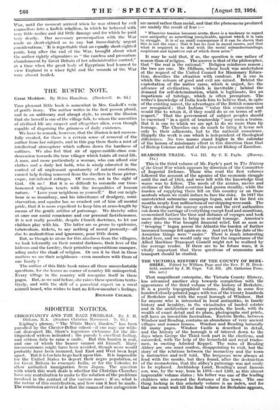THE RUSTIC NOTE.
Great Meddow. By Helen Hamilton. (Blackwell. 4s. 6d.) THIS pleasant little book is somewhat in Mrs. Gaskell's vein of gentle irony. The author writes in the first person plural, and in an unliterary and abrupt style, to create the illusion that she herself is one of the village folk, to whom the amenities of civilized life are suspect and altogether alien, even though capable of disguising the grimness of daily existence.
We have to remark, however, that the illusion is not success- fully created, for there is a certain sense of removal of the author from her subjects, and in this gap there floats a mist of intellectual atmosphere which softens down the hardness of outlines. We also feel that air of upper-middle-class con- descension towards the true villager which taints all rural life. A man, and more particularly a woman, who can afford nice clothes and a daily hot bath, who is nicely educated in the control of all unpleasant spontaneity of natural emotions, cannot help feeling removed from the dwellers in those pictur- esque, rat-infested cottages. Of course, not in the sight of God. Oh no 1 But it is so difficult to reconcile our time- honoured religious tenets with the inequalities of human nature. " Love your neighbour as yourself." But our neigh- bour is so insanitary, and his inheritance of drudgery, semi- starvation, and squalor has so crushed out of him all mental pride, that it is more expedient to keep him at arms-length by means of the gentle artifice of patronage. We thereby salve at once our social conscience and our personal fastidiousness. It is not really possible, despite Church doctrines, to let our children play with his. The latter are so prone to epidemics, tuberculosis, rickets, to say nothing of moral precocity—all due to malnutrition and ignorance, poor little dears.
But, as though to atone for this aloofness from the villagers, we look tolerantly on their mental darkness, their love of the hideous and the tawdry, their primitive superstitions masquer. ading under the cloak of religion. Or can it be that in these matters we are their neighbours—even members with them of one family ?
The author of this little book raises all these uncomfortable questions, for she leaves no corner of country life uninspected. Every village in the country will recognize itself in these pages. But, as we said before, she raises these questions tenta- tively, and with the skill of a parochial expert On a rural council board, who wishes to hurt no felloW-Member's feelings.
RICHARD CHURCH.


































 Previous page
Previous page